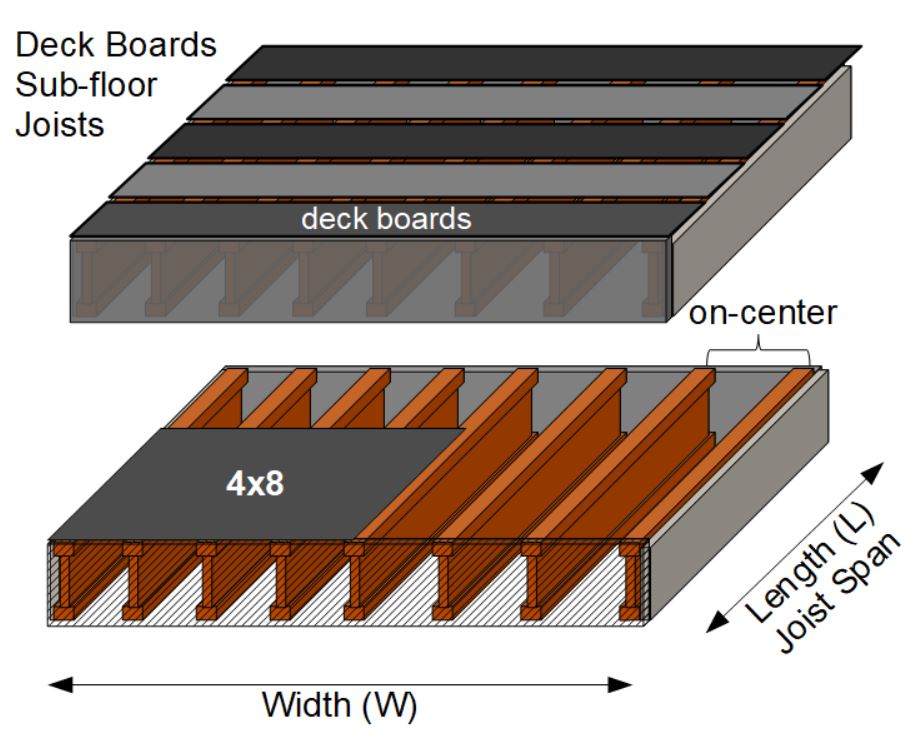Deck Builder Calculator
Tags | |
UUID | b2dfa621-fe72-11ee-9c91-bc764e203090 |
Deck Builder Calculator provides estimates for a simple rectangular deck project. Calculator functions include the following:
- Deck Board Count: Computes the number of decking boards needed for your deck based on the size of the deck and the size of the decking boards.

- Deck Boards Cost: Computes the cost of deck board flooring based on a computed number of deck boards and the price per board.
- Decking Cost Estimate: Estimates the cost of wood board decking based on total area and unit pricing in dollars per square feet.
- Subfloor 4x8 Sheets: Computes the number of 4x8 sheets to cover floor/deck area.
- Subfloor Cost: Computes the cost of 4x8 sheets to cover fool/deck area.
- Deck Joist Count: Computes the number of floor joists needed for a deck. It returns the number of joists and plate boards, square feet of area and the length of the diagonal.
- Joists on Beams
: Computes the number of joists (2x dimensional lumber or i-joists), number of beams, number of joist hangers, and length of plate boards needed for a floor or deck with a span that might require one or more beams.
- Deck Joist Cost: Computes the total cost of the floor joist boards.
- Deck Stain and Sealer: Computes the amount of stain and sealer needed for a deck.

The Math / Science
A deck, porch or just the floor under one's feet all have much in common. They need structural support and will need to be covered. This calculator is simple but useful in many applications. Decks can come in all shapes and sizes, but the most common is the simple rectangle with a width and length. For these calculators, the length is associated with the length of the independent joists. This length is also known as the joist span. Please consult your local building codes prior to building a deck to determine if the materials and construction method are adequate to accommodated the weight (load) that will be placed on the framing. Weight requirements can wildly vary. The most common object on decks that pose load challenges are hot tubs. These popular items contain large volumes of water that can literally weigh tons and pose dangerous loads on the deck structure.
Choosing the Right Length Deck Boards
When the width of your deck is longer than the length of your boards, splicing is required. If possible, you might want to consider longer boards if they are available. Longer boards will reduce or eliminate splicing which saves labor, and in some cases may even save material costs. For example, at the time of this writing, a nationally advertised provider of decking boards listed 5/4" thick, pressure treated, six inch wide deck boards that were $6.84 for 8' boards and $8.70 for 10' boards. In the graphic below, you can see where 10' boards only required 12 boards to cover the deck and 8' boards required 17 boards and 13 splices. In this case, the 10' boards ended up costing less at $104.40 verses $116.28.
Deck Board Materials
Decking boards, the planks that make up the surface of a deck, can be constructed from a variety of materials. Each material has its own set of characteristics, including durability, appearance, maintenance requirements, and cost. Here are some common materials used for decking boards:
- Wood (Natural):
- Pressure-Treated Pine: This is one of the most common and affordable options. It's treated with preservatives to resist decay, insects, and moisture. However, it requires periodic maintenance to maintain its appearance.
- Cedar: Known for its natural beauty and resistance to decay, cedar is a popular choice. It has a distinctive reddish-brown color and a pleasant aroma. It's more expensive than pressure-treated pine.
- Redwood: Similar to cedar, redwood is naturally resistant to decay and insects. It's known for its rich, reddish-brown color and durability. It's one of the more expensive wood options.
- Exotic Hardwoods (e.g., Ipe, Tigerwood): These tropical hardwoods are incredibly dense, durable, and resistant to decay. They have unique, rich colors and are known for their longevity. They are among the most expensive options.
- Composite:
- Composite Decking: Made from a combination of wood fibers and plastic, composite decking offers durability, low maintenance, and resistance to rot, insects, and UV rays. It comes in a wide range of colors and styles, simulating the look of wood.
- Plastic:
- PVC Decking: Made entirely of polyvinyl chloride, PVC decking is highly durable and resistant to moisture, mold, and insects. It doesn't require sealing or staining, but it can be more expensive than other options.
- Aluminum:
- Aluminum Decking: Known for its strength, durability, and resistance to moisture and insects, aluminum decking is often used in coastal areas or near water. It's low maintenance but can be more expensive upfront.
- Bamboo:
- Bamboo Decking: This is an eco-friendly option made from bamboo fibers and recycled plastics. It's durable and has a unique appearance, but availability may vary depending on location.
Flooring Price Survey Data
| Flooring Pricing Survey Data (U.S. dollars per square foot) | ||||||||
| Type | Store | Date | Prem. | High | Mid | Low | Econ. | n |
| Ceramic Tile | Menards | 11/2/23 | $16.11 | $5.78 | $4.44 | $2.28 | $0.44 | 88 |
| Hardwood | Menards | 11/3/23 | $7.11 | $4.98 | $4.01 | $0.68 | $0.37 | 60 |
| Hardwood Laminate | Menards | 11/6/23 | $7.11 | $5.49 | $4.75 | $3.91 | $1.68 | 42 |
| Carpet | Menards | 11/6/23 | $5.69 | $3.89 | $2.74 | $1.79 | $0.79 | 66 |
| Carpet Tile | Menards | 11/6/23 | $3.46 | $2.99 | $2.5 | $2.19 | $0.59 | 39 |
| Carpet Padding | Menards | 11/6/23 | $1.17 | $0.74 | $0.43 | $0.35 | $0.29 | 26 |
| Linoleum | Menards | 11/3/23 | $2.97 | $1.34 | $1.15 | $0.99 | $0.41 | 18 |
| Linoleum Tile | Menards | 11/7/23 | $5.12 | $4.44 | $1.22 | $0.89 | $0.75 | 16 |
| Wood Decking | Menards | 11/7/23 | $4.04 | $2.67 | $2.21 | $1.76 | $1.18 | 37 |
| Composite Decking | Menards | 11/7/23 | $11.54 | $7.35 | $5.98 | $5.21 | $3.81 | 21 |
Price Point Descriptions
- Premium - This is the highest cost per unit surveyed.
- High - This is the 75 percentile of surveyed costs.
- Mid - This is the median of surveyed costs.
- Low - This is the 25 percentile of surveyed costs.
- Economy - This is the lowest cost per unit surveyed.
- n - This is the sample size of the survey (number of products in the survey).
The above prices are for different flooring materials and price points in the United States as advertised on the date indicated by a large big-box DIY retailer on their public website. A retailer is surveyed and the number of products included in the survey is listed. Survey sample is typically not the complete product line of the retailer. This is purely for convenience of calculator users to make a rough estimate. Sample pricing is entered into Price Survey Tools to generate the statistics found above.
CAUTION: The pricing information provided is for calculating convenience with NO implied guarantees to the accuracy of the values listed. Authoritative sources should be sought to confirm any value before risking health or wealth on the veracity of the data. Furthermore, vCalc gives no guarantee that you will be able to buy products at listed prices or even if they will be available. The data provided is purely a convenience for making estimates, so we strongly recommend that one ALWAYS use local pricing and authoritative specifications.
Equations
- Deck Boards Count pro Use Equation
- Deck Boards Cost KurtHeckman Use Equation
- Decking Cost Estimate KurtHeckman Use Equation
- Subfloor 4x8 Sheets KurtHeckman Use Equation
- Subfloor Cost KurtHeckman Use Equation
- Floor Joist Count KurtHeckman Use Equation
- Joists on a Beam KurtHeckman Use Equation
- Floor Joist Cost KurtHeckman Use Equation
- Deck Stain and Sealer KurtHeckman Use Equation
Collections
- Comments
- Attachments
- Stats
No comments |

